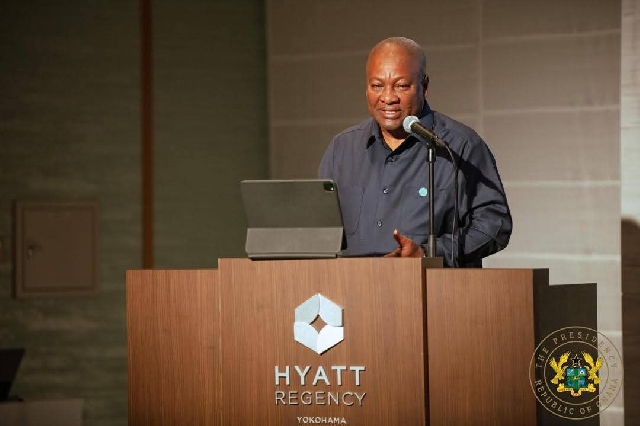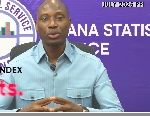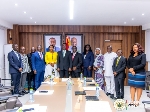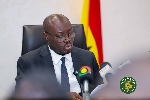Mahama woos Japanese investors, highlights Ghana as gateway to Africa’s 1.4 billion market
 John Mahama
John Mahama
President John Mahama has called on Japanese businesses to take advantage of Ghana’s strategic role as the gateway to Africa and tap into a continental market of over 1.4 billion people.
Speaking at the Ghana Presidential Investment Forum, held on the sidelines of the 9th Tokyo International Conference on African Development (TICAD IX) in Japan on Tueesday, the President described Ghana as “a stable, democratic, business-friendly hub” with a growing consumer base, improving macroeconomic indicators, and reforms aimed at lowering the cost of doing business.
He emphasised Ghana’s strategic location and its position as host of the African Continental Free Trade Area (AfCFTA) Secretariat, which facilitates duty-free and tariff-free trade across nearly 50 African countries.
“The sub-regional market, which is West Africa, is 400 million people.
Ghana is 33 million people.
And the continental market is 1.4 billion people.
With the African Continental Free Trade Area, you potentially can export into a 1.4 billion market,” he noted.
President Mahama outlined Ghana’s progress in stabilising its economy, citing inflation, which dropped from almost 23% in 2024 to 13.7% and is projected to fall into single digits by year’s end.
He also highlighted the cedi’s remarkable performance, describing it as “the best performing currency in the world this year,” and noted that Ghana’s credit rating had been upgraded from junk status to B-minus with a stable outlook.
On investment reforms, the President announced that Ghana was revising its Investment Promotion Centre Act to eliminate minimum capital requirements for foreign investors.
This, he explained, would open the door for both large and small businesses to set up operations in Ghana.
“This will enable any investor, however little money you have, $100,000, $50,000, to be able to come in and set up a business in Ghana,” he said.
Highlighting priority sectors, Mr. Mahama pointed to opportunities in automobile assembly, agribusiness, agro-processing, energy, manufacturing, and digital innovation.
He cited Toyota and Honda as examples of global brands already assembling vehicles in Ghana, with significant potential to scale across Africa.
In agriculture, he revealed plans for the Volta Economic Corridor, a flagship initiative to leverage Ghana’s vast arable land and Volta Lake for large-scale irrigation projects, while establishing industrial parks for agro-processing and textile production.
On energy, he stressed Ghana’s diversified portfolio of hydro, thermal, and gas-to-power investments, coupled with its integration into the West African Power Pool, which allows surplus energy exports to neighbouring states.
The President also touted Ghana’s modern infrastructure, highlighting the Tema and Takoradi ports, particularly the state-of-the-art MPS Port in Tema, which he described as “one of the best performing ports in Africa,” capable of accommodating the world’s largest cargo ships.
Additionally, he underscored Ghana’s rapidly expanding digital economy, powered by a young, English-speaking workforce and a vibrant fintech ecosystem.
To further ease the business process, Mr. Mahama promised expedited approvals and registrations at the Ghana Investment Promotion Centre (GIPC), with transactions completed within 24 hours.
He reassured Japanese investors of a secure business climate, with opportunities for public-private partnerships, blended finance, and joint ventures with local firms.
“Your business will be protected and will not be expropriated,” he assured.
President Mahama concluded by inviting Japanese companies to use Ghana as their hub for Africa, stressing that the continent represented the next frontier for global investment.
“Africa is opening up, is growing, and is a place that Japan should be looking at.
Let us marry Japanese precision with Ghanaian potential and create a win-win situation for ourselves,” he said.
He also highlighted his government’s $10 billion “Big Push” programme, which will prioritise infrastructure, agro-processing, industrialisation, and the rollout of Ghana’s new 24-hour economy policy aimed at boosting productivity and exports.
“Ghana,” he declared, “is open for business 24 hours a day.”
Source: classfmonline.com/Cecil Mensah
Trending Business

Producer Price Inflation drops to 3.8% in July 2025 –GSS
17:02
NPA urges safe LPG cylinder handling to prevent explosions
12:16
Expert urges gov't to avoid hasty return to international bond markets
11:27
FLEGT initiative key to curbing illegal lumber practices – Forestry Commission
09:22
Gov't reviewing GIPC Act to scrap minimum capital requirement – Mahama to investors
11:10
NPA warns against illegal storage and trade of petroleum products
08:51
Mahama woos Japanese investors, highlights Ghana as gateway to Africa’s 1.4 billion market
11:09
Fisheries Minister engages Blue Ventures on support for Ghana’s Inshore Exclusive Zone Policy
08:27
Ernest Thompson chairs Petroleum Commission board
02:13
Gov't pays GH¢9.7 billion coupon under Debt Exchange Programme
17:54



